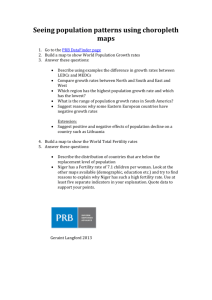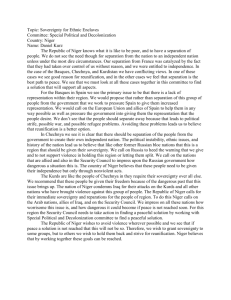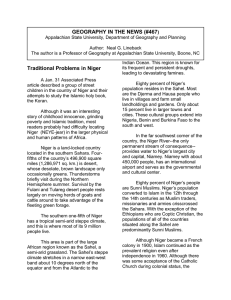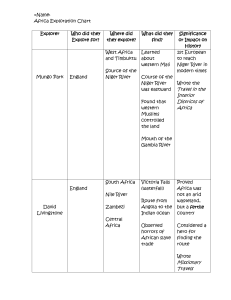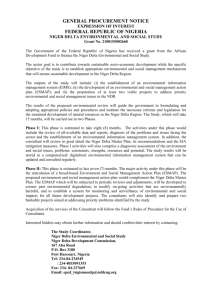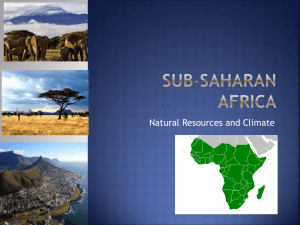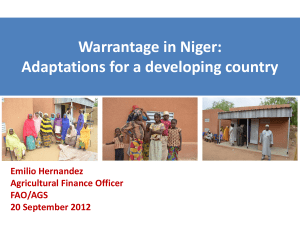ADVANCE QUESTIONS TO THE NIGER GERMANY
advertisement
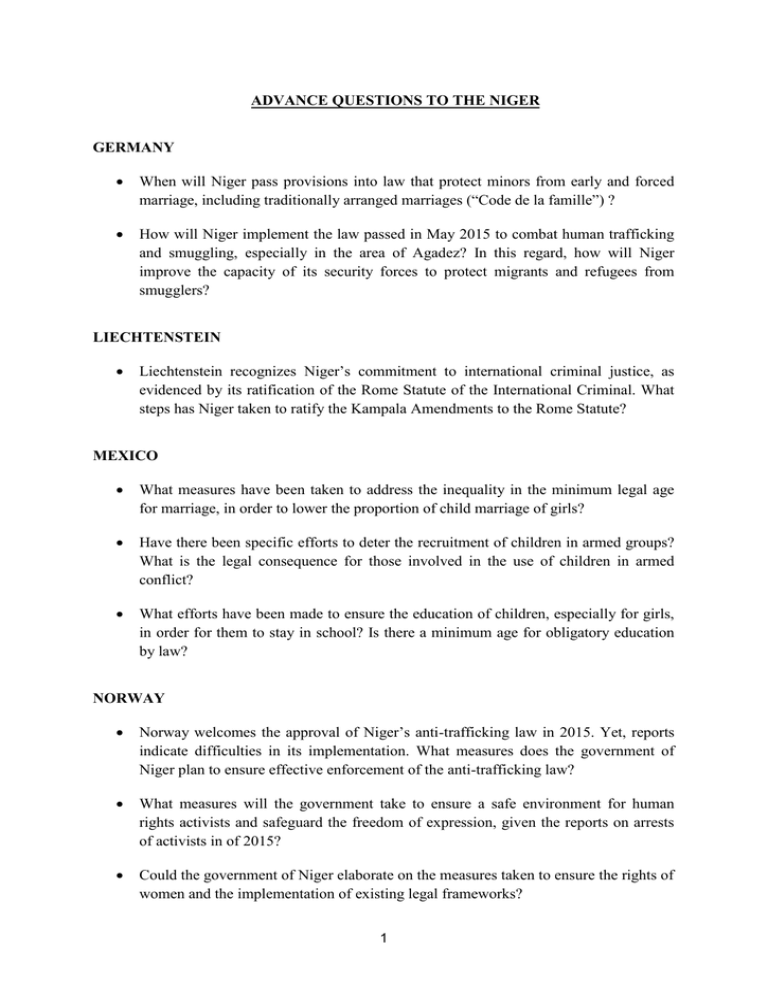
ADVANCE QUESTIONS TO THE NIGER GERMANY When will Niger pass provisions into law that protect minors from early and forced marriage, including traditionally arranged marriages (“Code de la famille”) ? How will Niger implement the law passed in May 2015 to combat human trafficking and smuggling, especially in the area of Agadez? In this regard, how will Niger improve the capacity of its security forces to protect migrants and refugees from smugglers? LIECHTENSTEIN Liechtenstein recognizes Niger’s commitment to international criminal justice, as evidenced by its ratification of the Rome Statute of the International Criminal. What steps has Niger taken to ratify the Kampala Amendments to the Rome Statute? MEXICO What measures have been taken to address the inequality in the minimum legal age for marriage, in order to lower the proportion of child marriage of girls? Have there been specific efforts to deter the recruitment of children in armed groups? What is the legal consequence for those involved in the use of children in armed conflict? What efforts have been made to ensure the education of children, especially for girls, in order for them to stay in school? Is there a minimum age for obligatory education by law? NORWAY Norway welcomes the approval of Niger’s anti-trafficking law in 2015. Yet, reports indicate difficulties in its implementation. What measures does the government of Niger plan to ensure effective enforcement of the anti-trafficking law? What measures will the government take to ensure a safe environment for human rights activists and safeguard the freedom of expression, given the reports on arrests of activists in of 2015? Could the government of Niger elaborate on the measures taken to ensure the rights of women and the implementation of existing legal frameworks? 1 Is the Government of Niger considering to establish a de jure moratorium on executions with a view to abolishing the death penalty and to formally commute all death sentences? SLOVENIA We regret to note that according to the Special Rapporteur on slavery, Niger has the highest proportion of child marriage in the world. What measures are being taken or are foreseen to eliminate child and forced marriage? We welcome the government's commitment to improving gender equality, but note that women continue to be seriously underrepresented in decision-making, have limited access to the labor market, are disadvantaged in terms of land ownership and inheritance, and remain mostly illiterate due to continuing gross gender disparities in access to education. How does the government intend to remedy this situation? Please tell us more about the "socioeconomic projects aimed at increasing women's monetary income" mentioned in paragraph 36 of the national report. Could you give some examples of the support available and how these projects have helped increase women's economic independence? We are concerned by reports that married girls, pregnant girls and unmarried mothers may be excluded from education. How is the government ensuring the equal right to education for all, irrespective of their marital status or motherhood? What is the envisioned time-frame for the adoption of a national strategy to combat gender-based violence? What is being done to ensure that uranium mining is not detrimental to the health of the local population, to access to safe drinking water, and does not jeopardize the livelihood of nomadic populations? What measures have been taken to implement the recommendations of the Special Rapporteur on slavery? What support and assistance is available to internally displaced persons, including those evacuated from islands in Lake Chad for security reasons? SPAIN Shortcomings in the procedure of birth registration continue hindering access to Human Rights, in particular the right to health and the right to education. Which concrete measures does the government of Niger intend to take to ensure effective birth registration? 2 The government of Niger has approved a system to control forced labour among the most vulnerable people. However, forced labour practices remain, including among children and women. Which measures has the government of Niger taken to eradicate forced labour in practice? SWITZERLAND Etant donné les efforts constructifs déjà entrepris par le Niger pour abolir la peine de mort, particulièrement la commutation de toutes les condamnations à mort, quelles sont les prochaines mesures envisagées pour ratifier le deuxième Protocole facultatif au Pacte international relatif aux droits civils et politiques, en vue d’une abolition de jure ? Malgré le cadre légal criminalisant l’esclavage et la modification du Code du Travail pour interdire le travail forcé et les pires formes du travail des enfants au Niger, les progrès envers leur mise en œuvre sont modestes. Quelles mesures le Niger entend-il entreprendre afin de renforcer la mise en œuvre des instruments juridiques permettant de lutter contre le travail des enfants, y compris des enfants migrants ? UNITED KINGDOM OF GREAT BRITAIN AND NORTHERN IRELAND What steps will the Government of Niger take to address violence and discrimination against women and girls, including banning child, early and forced marriage and implementation of laws forbidding Female Genital Mutilation? What is the Government of Niger doing to ensure that the immediate needs of all displaced people are met, including to adequate shelter, food, water, sanitation and healthcare, particularly those escaping conflict and insecurity in neighbouring countries? How does the Government of Niger intend to promote and protect political freedoms for all, including the rights to freedom of expression and to assembly, in the run up to the Presidential elections in February 2016 and beyond? What action is the Government of Niger taking to promote and protect the rights of journalists and civil society organisations and ensure that they are not unduly detained, hindered, harassed or intimidated as a result of their work on human rights? What action is the Government of Niger taking to enforce its anti-slavery law, identify and assist victims, and implement the recommendations made by the UN Special Rapporteur on contemporary forms of slavery following her 2014 country visit? 3
